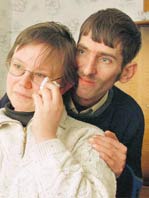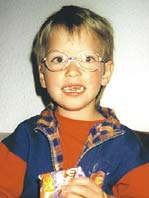Ämter
nahmen ihnen vor 5 Jahren die Kinder weg
Sind
diese Eltern zu dumm für ihre zwei Kinder?
Von M. BREKENKAMP
 Freudentränen
bei Annette und Ingo K. Nach fünf Jahren hat der Europäische
Gerichtshof ihnen ihre Kinder wieder zugesprochen
Freudentränen
bei Annette und Ingo K. Nach fünf Jahren hat der Europäische
Gerichtshof ihnen ihre Kinder wieder zugesprochen
Bielefeld/Straßburg – „Eine Familie
ist ein so hohes Gut, das auch kein Amt oder Gericht es beschädigen
darf“ (Az: 46544/99 EuGH).
Mit diesen Worten beendete der Europäische
Gerichtshof in Straßburg den fünfjährigen Kampf eines Elternpaares
um seine zwei Kinder. Sie seien zu dumm, Kinder zu erziehen, hatten Behörden
entschieden und die Kleinen in die Obhut einer Pflegefamilie übergeben.
Der einmalige Fall: Annette (33) und Ingo
K. (35) wohnen in Badbergen bei Osnabrück. Vor fünf Jahren bemerkten
die beiden bei ihren Kindern Nicola (4) und Corinna (jetzt 6) eine Lernschwäche.
Ingo K., Arbeiter auf einer Hühnerfarm: „Wir beantragten beim Jugendamt
Unterstützung für eine heilpädagogische Hilfe.“ Die Psychologen
kamen – und kümmerten sich um die Eltern statt die Kinder.
 Corinna
(10) ist durch das Jugendamt ihrer Familie entwöhnt worden. Ihre Eltern
nennt sie nicht mehr Mama und Papa
Corinna
(10) ist durch das Jugendamt ihrer Familie entwöhnt worden. Ihre Eltern
nennt sie nicht mehr Mama und Papa
Sie erstellten Gutachten. Über die
Mutter: „...besitzt kaum Eigenständigkeit und Selbstvertrauen.“ Über
den Vater: „...ist durch Arbeitsverpflichtungen geprägt. Beim Memory-Spiel
mussten die Kinder ihm die Spielregeln erklären.“
Fazit der Psychologen: „Die Eltern sind
intellektuell nicht in der Lage, ihre Kinder zu erziehen.“ Ingo K.: „Sie
sagten uns schlicht, wir seien zu dumm!“
Kurz darauf entzog das Amtsgericht Bersenbrück
auf Betreiben des Jugendamtes den Eltern das Sorgerecht.
Die Mädchen kamen zu verschiedenen
Pflegeeltern. Nur einmal im Monat durften die Eltern sie sehen – für
eine Stunde auf neutralem Boden in einer Kinderkrippe, unter Aufsicht von
sieben Betreuern. Zärtlichkeiten und Kuscheln verboten.
 Nicola
wird heute neun Jahre alt. Ihren Geburtstag muss sie aber noch bei den
Pflegeeltern feiern
Nicola
wird heute neun Jahre alt. Ihren Geburtstag muss sie aber noch bei den
Pflegeeltern feiern
Annette und Ingo K. gaben nicht auf. Sie
nahmen sich einen Anwalt, ließen Gegengutachten erstellen, sammelten
Unterschriften – und klagten bis vor den Europäischen Gerichtshof.
Dort entschieden sieben Richter gestern
einstimmig: „Kinder dürfen von ihren Eltern nicht wegen ihrer intellektuellen
Fähig- oder Unfähigkeiten getrennt werden. Sie müssen zu
ihren leiblichen Eltern zurück.“
Osnabrücks Landkreissprecher Burkhard
Riepenhoff: „Wir warten jetzt auf Weisung des Bundesjustizministeriums.“
In einem behutsamen Verfahren sollen
die Kinder in den kommenden Monaten wieder an ihre Eltern gewöhnt
werden. Die Mutter: „Wir freuen uns so. Sie sagten zuletzt nicht mehr Mama
und Papa zu uns.“
27.02.2002
www.bild.de/service/archiv/2002/feb/27/news/eltern/eltern.html
Die ”dummen Eltern”, denen
die Behörden die Kinder wegnahmen
Wann
dürfen sie ihre Töchter wieder umarmen?
Von M. BREKENKAMP
 Annette
(33) und Ingo K. (35): Tränen der Trauer um die gestohlene Zeit mit
ihren Kindern – und Hoffnung, dass sie bald wieder wie eine Familie leben
können
Annette
(33) und Ingo K. (35): Tränen der Trauer um die gestohlene Zeit mit
ihren Kindern – und Hoffnung, dass sie bald wieder wie eine Familie leben
können
Osnabrück/Straßburg – Können
die Behörden das, was sie hier angerichtet haben, jemals wieder gut
machen?
Vor fünf Jahren entzog das Amtsgericht
Bersenbrück den Eltern Annette (33) und Ingo K. (35) das Sorgerecht
für ihre Töchter Nicola (9) und Corinna (10). Begründung:
Sie seien zu dumm, Kinder zu erziehen. Der Europäische Gerichtshof
für Menschenrechte entschied: Die Kleinen kommen zurück (BILD
berichtete).
Ist das Gezerre um die Kinder jetzt
wirklich vorbei?
Nicola wurde gestern 9 und feierte bei
ihrer Pflegefamilie, bei der sie inzwischen mehr als die Hälfte ihres
Lebens verbracht hat. Die wahren Eltern durften ihr noch nicht einmal gratulieren.
Mutter Annette: „Wir wissen immer noch nicht, wie es jetzt genau weiter
geht. Wir wollen auch keinen neuen Ärger mit dem Jugendamt.“
 Nicola
und Corinna (heute 9 und 10) leben seit fünf Jahren in Pflegefamilien
– obwohl ihre Mutter Annette K. sogar eine Ausbildung zur Tagesmutter (Lehrstunden
von Psychologie bis „Gesunde Ernährung“) absolvierte: mit Zertifikat
Nicola
und Corinna (heute 9 und 10) leben seit fünf Jahren in Pflegefamilien
– obwohl ihre Mutter Annette K. sogar eine Ausbildung zur Tagesmutter (Lehrstunden
von Psychologie bis „Gesunde Ernährung“) absolvierte: mit Zertifikat
Volker Laubert, Vorsitzender des Vereins
„Aktion Rechte für Kinder e. V.“ stand den Eltern all die Jahre zur
Seite, auch gestern musste er sie beruhigen: „Das Urteil des Europäischen
Gerichtshofes ist endgültig.“
Wie geht es jetzt weiter? Werden die
Kinder von der Polizei aus den Pflegefamilien geholt?
Laubert: „Nein. Wir
müssen mit dem Jugendamt gemeinsam festlegen, wie die Kinder behutsam
an ihre Familie herangeführt werden.“
Wie wird dieser
Prozess aussehen?
Laubert: „Vor allem wichtig: Es darf nichts
gegen den Willen der Kinder geschehen. Wir stellen uns vor, dass die Kinder
ab jetzt einmal pro Woche ihre Eltern treffen (bisher einmal im Monat,
d. Red.) – ohne Aufsicht des Jugendamtes. Später könnten auch
Übernachtungen stattfinden, gemeinsame Ferien. Doch wir müssen
mit ein, zwei Jahren rechnen, bis die Rückführung vollendet ist.“
Die Mutter suchte gestern die Kuscheltiere
der Kinder zusammen, saß lange im alten Kinderzimmer. „Ob sie sich
hier noch einmal zu Hause fühlen können?“, sagte sie nachdenklich.
27.02.2002
www.bild.de/service/archiv/2002/feb/28/news/eltern/eltern.html
Deutschland wegen Verstoßes
gegen Familienrecht verurteilt
Datum: 26.02.2002 16:07:50 (MEZ) Mitteleuropäische
Zeit
Von: AOL - NewsBote
Straßburg (dpa) - Deutschland ist
vom Europäischen Gerichtshof für Menschenrechte wegen Verstoßes
gegen das Grundrecht auf Familienleben verurteilt worden. Wie ein Gerichtssprecher
am Dienstag in bekannt gab, hatte ein Elternpaar aus der Nähe von
Osnabrück in Straßburg Beschwerde eingelegt. Das Jugendamt hatte
ihnen 1997 die damals sechs und vier Jahre alten Töchter weggenommen
und in Pflegefamilien gegeben, weil das Paar nach Auffassung der Behörde
intellektuell unfähig, war die Erziehung der Mädchen zu gewährleisten.
Deutschland muss den Eltern nun insgesamt
über 22 600 Euro Schadenersatz zahlen.
Die 34 und 36 Jahre alten Eltern hatten
als Kinder eine Sonderschule für Lernbehinderte besucht. Da Ärzte
auch bei den beiden Töchtern eine verzögerte geistige und körperliche
Entwicklung feststellten, bekamen beide auf Wunsch der Eltern von klein
auf Frühförderung und besuchten einen heilpädagogischen
Kindergarten. Nach der Wegnahme der Kinder verbot ihnen ein Osnabrücker
Gericht 1998 jeglichen Umgang mit den bei Pflegefamilien untergebrachten
Töchtern. Später durften sie die Kinder zwei Stunden pro Monat
sehen.
Die Straßburger Richter bezeichneten
die Trennung der Kinder von ihren Eltern als "unangemessen". Die medizinischen
und psychiatrischen Gutachten über den Zustand der Kinder hätten
sich widersprochen und keine Verwahrlosung oder Misshandlung festgestellt.
Die Trennung eines Kindes von seinen Eltern dürfe außerdem nur
vorübergehend sein. Ziel müsse es sein, die Familie wieder zusammenzuführen,
wenn es die Umstände erlauben, urteilten die Richter.
(Internet: http://www.echr.coe.int)
dpa
26.2.2002
Press release issued by the Registrar
CHAMBER JUDGMENT IN THE
CASE OF KUTZNER v. GERMANY
In a judgment [fn] delivered at Strasbourg
on 26 February 2002 in the case of Kutzner v. Germany (application no.
46544/99), the European Court of Human Rights held unanimously that there
had been a violation of Article 8 (right to respect for private and family
life) of the European Convention on Human Rights.
Under Article 41 (just satisfaction) of
the Convention, the Court awarded the applicants 15,000 euros (EUR) for
non-pecuniary damage and EUR 8,000 (less EUR 350.63) for legal costs and
expenses. (The judgment is in French only).
1. Principal facts
The applicants, Ingo and Annette Kutzner,
are German nationals who were born in 1966 and 1968 respectively and live
at Badbergen (Germany). They are married and have two daughters: Corinna,
who was born on 11 September 1991, and Nicola, who was born on 27 February
1993.
The applicants and their two daughters
had lived since the children’s birth with Mr Kutzner’s parents and an unmarried
brother in an old farmhouse. The applicants had attended a special school
for people with learning difficulties. Owing to their late physical and,
more particularly, mental development, the girls were examined on a number
of occasions by doctors. On the advice of one of the doctors and on application
by the applicants, the girls had received educational assistance and support
from a very early age.
On 27 May 1997 the Bersenbrück Guardianship
Court withdrew the applicants’ parental rights over their two daughters
and ordered their placement with foster parents, notably on the ground
that the applicants did not have the intellectual capacity required to
bring up their children, but also on the ground that the girls were very
late in their mental and physical development and the applicants had failed
to cooperate with social services.
In a judgment of 29 January 1998 the Osnabrück
Regional Court, relying on two expert reports, one highlighting the parents’
mental retardation and the second their emotional underdevelopment, upheld
the Guardianship Court’s order for the girls’ placement.
The girls were placed in separate, unidentified,
foster homes and restrictions were imposed on the applicants’ visiting
rights. The applicants were not permitted to see their children during
the first six months; thereafter they were given visiting rights in the
presence of third parties initially of one hour monthly, subsequently increased
to two hours monthly.
2. Procedure and composition of
the Court
The application was lodged with the European
Commission of Human Rights on 5 July 1998 and transferred to the Court
on 1 November 1998. It was declared admissible on 10 July 2001.
Judgment was given by a Chamber of seven
judges, composed as follows:
Antonio Pastor Ridruejo (Spanish), President,
Georg Ress (German),
Lucius Caflisch (Swiss),
Jerzy Makarczyk (Polish),
Ireneu Cabral Barreto (Portuguese),
Nina Vaji? (Croatian),
Matti Pellonpää (Finnish), judges,
and also Vincent Berger, Section Registrar.
3. Summary of the judgment
Complaint
The applicants maintained that the withdrawal
of their parental rights over their daughters and their placement with
foster parents had infringed their right to respect for family life, as
guaranteed by Article 8.
Decision of the Court
Article 8
The Court recognised that the authorities
may have had legitimate concerns about the late development of the children
noted by the various social services departments concerned and the psychologists.
However, it found that both the order for placement in itself and, above
all, its implementation were unsatisfactory.
It appeared that the children had benefited
from an early age – and at the applicants’ request – from educational support
and that the situation had become acrimonious as a result notably of a
conflict between the applicants and a social worker who submitted a very
negative report to the Osnabrück Youth Office.
Further, the opinions of the psychologists
consulted at various stages of the proceedings before the domestic courts
were contradictory if not as regards their conclusions then at least as
regards the reasons relied on (one psychologist referred to the parents’
lack of intellectual capacity while the other referred to emotional underdevelopment
that made them incapable of contributing to the development of the children’s
personality). Moreover, other psychologists who had been retained as expert
witnesses by the German Association for the Protection of Children and
the Association for the Defence of the Rights of the Child and family doctors
urged that the children be returned to their family of origin. They emphasised
in particular that there was no danger for the children’s welfare and that
the applicants were entirely fit to bring up their children both emotionally
and intellectually. They said that the children should be given additional
educational support.
Those conclusions could not be disregarded
simply because their authors were acting privately. Lastly, at no stage
was it alleged that the children had been neglected or ill-treated by the
applicants. Accordingly, although the educational support measures taken
initially subsequently proved inadequate, the question arose whether the
domestic administrative and judicial authorities had given sufficient consideration
to additional measures of support as an alternative to what was by far
the most extreme measure, namely separating the children from their parents.
The Court reiterated that a care order
had in principle to be regarded as a temporary measure, to be discontinued
as soon as circumstances permitted, and that any measures implementing
temporary care had to be consistent with the ultimate aim of reuniting
the natural parents and the child. The positive duty to take measures to
facilitate family reunification as soon as reasonably feasible would begin
to weigh on the responsible authorities with progressively increasing force
as from the commencement of the period of care, subject always to its being
balanced against the duty to consider the best interests of the child.
However, in the case before the Court,
not only had the children been separated from their family of origin, they
had also been placed in separate, unidentified, foster homes and all contact
with their parents severed for the first six months. The children were
at no stage heard by the judges.
The case file also showed that the applicants
had only been granted visiting rights after making an application to the
court, while the visits were in practice systematically obstructed by the
Osnabrück Youth Office and, initially, were restricted to one hour
monthly in the presence of eight people who were not members of the family,
before being extended to two hours monthly (with the grandparents being
authorised to visit once every two months) by a decision of the Osnabrück
Guardianship Court of 9 October 2000.
Having regard to the fact that the children
were very young, severing contact in that way and imposing such restrictions
on visiting rights could, in the Court’s opinion, only lead to the children’s
increased "alienation" from their parents and from each other. Similarly,
the dispute on that issue could not be regarded as having been resolved,
as the applicants had consistently contested not only their children’s
placement with foster parents, but also the restrictions imposed on their
visiting rights and they could not in practice be criticised for having
made use of the arrangements afforded by the domestic courts to enable
them at least to see their children.
Having regard to all those circumstances,
the Court considered that although the reasons relied on by the administrative
and judicial authorities were relevant, they were not sufficient to justify
such a serious interference in the applicants ’ family life. Notwithstanding
the domestic authorities’ margin of appreciation, the interference had
therefore not been proportionate to the legitimate aims pursued. Consequently,
there had been a violation of Article 8 of the Convention.
***
The Court’s judgments are accessible on
its Internet site
http://www.echr.coe.int
Registry of the European Court of Human
Rights
F – 67075 Strasbourg Cedex
Contacts: Roderick Liddell (telephone:
(0)3 88 41 24 92)
Emma Hellyer (telephone: (0)3 90 21 42
15)
Fax: (0)3 88 41 27 91
The European Court of Human Rights was
set up in Strasbourg in 1959 to deal with alleged violations of the 1950
European Convention on Human Rights. On 1 November 1998 a full-time Court
was established, replacing the original two-tier system of a part-time
Commission and Court.
[fn] Under Article 43 of the European
Convention on Human Rights, within three months from the date of a Chamber
judgment, any party to the case may, in exceptional cases, request that
the case be referred to the 17-member Grand Chamber of the Court. In that
event, a panel of five judges considers whether the case raises a serious
question affecting the interpretation or application of the Convention
or its Protocols, or a serious issue of general importance, in which case
the Grand Chamber will deliver a final judgment. If no such question or
issue arises, the panel will reject the request, at which point the judgment
becomes final. Otherwise Chamber judgments become final on the expiry of
the three-month period or earlier if the parties declare that they do not
intend to make a request to refer.
 Freudentränen
bei Annette und Ingo K. Nach fünf Jahren hat der Europäische
Gerichtshof ihnen ihre Kinder wieder zugesprochen
Freudentränen
bei Annette und Ingo K. Nach fünf Jahren hat der Europäische
Gerichtshof ihnen ihre Kinder wieder zugesprochen
 Corinna
(10) ist durch das Jugendamt ihrer Familie entwöhnt worden. Ihre Eltern
nennt sie nicht mehr Mama und Papa
Corinna
(10) ist durch das Jugendamt ihrer Familie entwöhnt worden. Ihre Eltern
nennt sie nicht mehr Mama und Papa
 Nicola
wird heute neun Jahre alt. Ihren Geburtstag muss sie aber noch bei den
Pflegeeltern feiern
Nicola
wird heute neun Jahre alt. Ihren Geburtstag muss sie aber noch bei den
Pflegeeltern feiern
 Annette
(33) und Ingo K. (35): Tränen der Trauer um die gestohlene Zeit mit
ihren Kindern – und Hoffnung, dass sie bald wieder wie eine Familie leben
können
Annette
(33) und Ingo K. (35): Tränen der Trauer um die gestohlene Zeit mit
ihren Kindern – und Hoffnung, dass sie bald wieder wie eine Familie leben
können
 Nicola
und Corinna (heute 9 und 10) leben seit fünf Jahren in Pflegefamilien
– obwohl ihre Mutter Annette K. sogar eine Ausbildung zur Tagesmutter (Lehrstunden
von Psychologie bis „Gesunde Ernährung“) absolvierte: mit Zertifikat
Nicola
und Corinna (heute 9 und 10) leben seit fünf Jahren in Pflegefamilien
– obwohl ihre Mutter Annette K. sogar eine Ausbildung zur Tagesmutter (Lehrstunden
von Psychologie bis „Gesunde Ernährung“) absolvierte: mit Zertifikat
